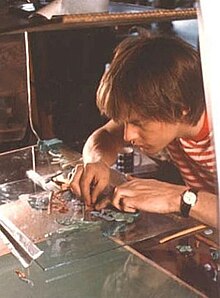Eli Noyes
Eli Noyes | |
|---|---|
 Noyes in 1964 | |
| Born | Eliot Fette Noyes, Jr. October 18, 1942 Amherst, Massachusetts, U.S. |
| Died | March 23, 2024 (aged 81) |
| Education | Harvard University |
| Occupation | Animator |
| Notable work | Clay or the Origin of Species |
| Style | Stop motion |
| Spouse | Augusta Talbot |
| Children | 2 |
| Parent |
|
Eliot Fette Noyes, Jr. (October 18, 1942 – March 23, 2024) was an American animator most noted for his
Noyes partnered with
Early life and education
Eliot Fette Noyes, Jr. was born on October 18, 1942, in
Career
Noyes started creating animated images in his teens and was one of the first animators to use clay.[5] In 1964, Noyes created the eight-minute animated film Clay or the Origin of Species which was nominated for the Academy Award for Best Animated Short Film.[3] The film is considered one of the earliest examples of claymation, establishing it as a medium.[4] The work was cited by Wallace and Gromit creators, Peter Lord and David Sproxton, as a large influence on their work.[6]
In the early 1970s, Noyes filmed documentaries with Claudia Weil, including This Is the Home of Mrs. Levant Graham, a cinéma vérité film of the life of a Black family in Washington, D.C., and Aspen: 1970, which concerned a "generational clash of architects".[7] Noyes also used sand for his animations, including in his 1973 work Sandman and the 1976 pixelated stop motion Peanut Butter and Jelly. He also designed animated sand pinwheels for the Nickelodeon show Pinwheel[1] and created the sand alphabet for Sesame Street.[8]
Noyes partnered with
After relocating to Northern California in the 1990s, Noyes developed the
In 2003, Noyes co-founded the animation production studio Alligator Planet with
Noyes designed "Go Green" postage stamps for the United States Postal Service in 2011.[1][10]
Personal life and death
Noyes was married to Augusta Talbot and had two children, Isaac and Abigail. He and his family moved to San Francisco in 1991.[1] He enjoyed jazz piano and played the accordion and oboe.[7]
Noyes died in San Francisco on March 23, 2024, at the age of 81, owing to complications from prostate cancer.[9][1]
Filmography
- Clay or the Origin of Species (1964)[11]
- Alphabet (1966)[12]
- This Is the Home of Mrs. Levant Graham (1970)[1]
- Aspen: 1970 (1970)[1]
- Sandman (1973)[13]
- Worm Dances (1973)[14]
- Sesame Street ("Sand Letters" shorts) (1974–1991) (TV series)[8]
- The Fable of He and She (1974)[15]
- Bad Dog (1976)[16]
- Peanut Butter & Jelly (1976)[1]
- Braingames (1983–1985) (TV series)[1]
- Nickelodeon (network IDs) (1985–1989) (TV series)[7]
- Nick at Nite (launch IDs) (1986) (TV series)[5]
- Eureeka's Castle (1989–1994) (TV series)[1]
- Liquid Television (1991–1994) (TV series)[1]
References
- ^ Hollywood Reporter. Archivedfrom the original on March 27, 2024. Retrieved March 25, 2024.
- ^ "Elm Lea Circle | Community | The Putney School". www.elmleacircle.com. Archived from the original on January 18, 2024. Retrieved March 27, 2024.
- ^ a b Ireland, Corydon (February 9, 2010). "'Frame by Frame'". Harvard Gazette. Archived from the original on June 2, 2019. Retrieved March 1, 2017.
- ^ a b Gardner, Robert (January 12, 2010). "Exhibition Showcases Animated Films from Harvard's Long History with the Practice". ArtDaily. Cambridge, Massachusetts. Retrieved March 1, 2017.
- ^ ISBN 978-0-517-88602-1.
- ^ Debruge, Peter (June 7, 2016). "At 40, Aardman Animations Stays Stubbornly Eccentric". Variety. Archived from the original on November 17, 2017. Retrieved December 12, 2017.
- ^ a b c Sarto, Debbie Diamond (March 25, 2024). "Animation, Film, and Media Creator Eli Noyes Dies at 81". Animation World Network.
- ^ ISBN 978-0-316-41944-4.
- ^ a b c d Pederson, Erik (March 25, 2024). "Eli Noyes Dies: Oscar-Nominated Stop-Motion Animator Who Worked On MTV's 'Liquid Television' Was 81". Deadline Hollywood. Archived from the original on March 26, 2024. Retrieved March 25, 2024.
- ^ "Postal Bulletin 22307 | Publicity Kit: Go Green Forever Stamps". usps.com. United States Postal Service. March 24, 2011. Retrieved March 29, 2024.
Artist Eli Noyes of San Francisco, California, gets the point across in a colorful and playful manner.
- OCLC 740918527)
- ^ Film Library Quarterly. Film Library Information Council. 1976. p. 12.
- ^ "Cartoons Considered For An Academy Award 1973 -". cartoonresearch.com. Archived from the original on October 4, 2018. Retrieved October 11, 2018.
- ^ Raynor, Vivien (May 17, 1981). "Art; Film-Video Success at the Thorpe". The New York Times. Archived from the original on May 24, 2015. Retrieved March 26, 2024.
- ^ "Briefs on the Arts". The New York Times. June 7, 1975. p. 14.
- ^ "At the Movies with Bad Dog" (PDF). South Carolina Arts Commission. Retrieved March 26, 2024.
External links
- Alligator Planet
- Eli Noyes at IMDb
- Eli Noyes at the TCM Movie Database
- Eli Noyes's channel on Vimeo
- Eli Noyes's channel on YouTube
